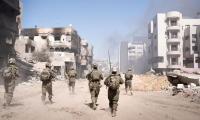LAHORE :Punjab Minister for Primary and Secondary Healthcare Khawaja Imran Nazir has said that Punjab government is trying to fill the gaps in health sector prevailing for the last 70 years. He said that some individual act of negligence spoils the image of whole department. He further said that the night duty timing of gynecologists will be monitored strictly.
He expressed these views while addressing a ceremony held in connection with the launch of Health Week 2017 in a local hotel on Sunday. The minister said that Primary and Secondary Healthcare Department (P&SHD) observed Health Week 2017 from August 15 to Aug 19 during which 438 screening camps were set up and 362,000 people were screened across Punjab.
Khawaja Imran said that the decision of Chief Minister Shahbaz Sharif to divide the health department into two separate departments increased the service delivery and efficiency in the health sector.On the occasion, the minister for specialised healthcare and medical education said that Punjab government under the vision of the chief minister was spreading the network of hospitals and health facilities in whole Punjab. He claimed best health facilities were being provided in tehsil and district headquarters hospitals.
P&SHD Secretary Ali Jan Khan briefed the participants on the results of the Health Week report. He said that findings would be helpful for the prevention and cure of communicable and non-communicable diseases.
The international health organisations and donor partners appreciated the P&SHD for initiating such a positive step which is directly related to the health of the poorest strata of society.
Health managers: The Health Managers Association (HMA), Punjab, has pointed out that, in the recent few months, some elements are actively blaming the medical profession and health department, and trying to make the department and medical profession controversial.
“These elements are trying to provoke patients and their attendants over minor things and bringing it to public attention to undermine the rapidly progressing health department’s activities,” said Dr Haq Nawaz Bharwana, general secretary, Health Managers Association, Punjab, while addressing a meeting of the association here on Sunday.
Dr Bharwana said that the increasing load on tertiary healthcare facilities demanded that the patients and their attendants should also understand how to utilise and get the benefit of services offered in tertiary care hospital. He said that the recent incidence of Ganga Ram Hospital was also exploited by a few, as the facts were not properly exposed. The fact is that the patient went to the canteen without the consent and advice of consultants, and thus suffered, he said and added that now the punishment was being given to the doctors, hospitals and health department. If this behaviour continued, it may lead to brain drain, he added. Dr Bharwana said that for the last one and a half years, the progress of Specialized Healthcare Department can’t be matched with that in the previous tenures.
He added that the construction of 385-bed Surgical Tower in Mayo Hospital Lahore, state-of-the-art 100-bed Punjab addiction treatment hospital, Lahore, newly constructed OPD of Services Hospital, new block of Children Hospital, Lahore, cardiology hospitals of Faisalabad, Wazirabad and Rawalpindi, burn units of Jinnah Hospital and Bahawalpur hospital, emergency department and burn unit of Aziz Bhatti Shaheed Hospital, Gujrat were the examples of progress of Specialised Healthcare and Medical Education Department.
To achieve the maximum benefits from the newly-established facilities, there is a need to create awareness among the public that could done by joint adventures of doctors, NGOs, hospital administration, media, public representatives and the people themselves.
Dr Bharwana said that the emergency department of Ganga Ram Hospital was one of the best emergency centres in the province where doctors, nurses and medicines were available round the clock.
Minister for Mines & Minerals Sardar Sher Ali Gorchani seen in this image on April 1, 2024. — Facebook/Sardar Sher...
This photograph shows students attending a class at a school on the outskirts of Lahore. — AFP/FileLAHORE:Department...
Lahore Waste Management Company workers cleaning the streets. — APP/FileLAHORE:Lahore Waste Management Company has...
UHS Vice Chancellor Prof Ahsan Waheed Rathore sits during a meeting. — X/@uhslhrofficial/File LAHORE:The 79th...
This image shows Punjab police personnel standing alert. — AFP/FileLAHORE:On the instructions of Director General...
Representational image showing dark clouds. — PPI/FileLAHORE:Partly cloudy weather with hot and humid conditions was...







